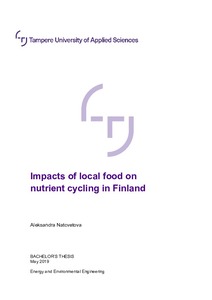Impacts of local food on nutrient cycling in Finland
Natcvetova, Aleksandra (2019)
Natcvetova, Aleksandra
2019
All rights reserved. This publication is copyrighted. You may download, display and print it for Your own personal use. Commercial use is prohibited.
Julkaisun pysyvä osoite on
https://urn.fi/URN:NBN:fi:amk-2019060314279
https://urn.fi/URN:NBN:fi:amk-2019060314279
Tiivistelmä
This Bachelor’ thesis was commissioned by the “Learn about nutrients!” (ORAS) project in collaboration with Tampere University of Applied Sciences. The project aims to encourage the nutrient recycling in Finland and thus to improve the ecological status of the Archipelago Sea. The objective of this study was to investigate whether there are any misunderstandings in communication between local food producers (farmers) and the restaurant business in establishing a trustable networking partnership, as well as what obstacles should be taken into account when promoting the use of local food.
The study was conducted by analysing the available data regarding the economic, environmental and social value of local food and nutrient recycling. Several semi-structured open-ended interviews were conducted with the representatives of both the farms and the restaurants to assess the results and compare them with the outcomes of the analysed studies.
The obtained results reveal that closer cooperation between local food producers and restaurants may have a direct positive impact of nutrient recycling by stimulating the Finnish farmers’ interest in use of recycled fertilisers instead of inorganic ones. This way, local food contribution in nutrient recycling may lessen the amount of excessive nutrients discharged into the environment and thus help alleviate the nutrient burden of the Baltic Sea. The study also shows that both farmers and restaurants are eager to run their business in more sustainable way and to cooperate closely with each other. However, their efficient communication may be restrained by simple lack of knowledge, a large number of participants in between and stringent yet vague public regulations.
It can be concluded that efficient nutrient recycling introduction will depend on a policy reform and availability of structured and coherent instructions. A practical example achieved through successful regional trials should be provided to farmers to overcome the distrust on nutrient recycling. The results suggest that nutrient recycling should be presented as an environmental and business advantage. The best way to support small restaurant business is to help their suppliers. That is why, with the declining amount of financial aid, it is especially important to elaborate an effective allocation of money, part of which could be invested in farmers’ education regarding nutrient recycling and, thus, to prevent future expenses on the environmental restoration of farmlands.
The study was conducted by analysing the available data regarding the economic, environmental and social value of local food and nutrient recycling. Several semi-structured open-ended interviews were conducted with the representatives of both the farms and the restaurants to assess the results and compare them with the outcomes of the analysed studies.
The obtained results reveal that closer cooperation between local food producers and restaurants may have a direct positive impact of nutrient recycling by stimulating the Finnish farmers’ interest in use of recycled fertilisers instead of inorganic ones. This way, local food contribution in nutrient recycling may lessen the amount of excessive nutrients discharged into the environment and thus help alleviate the nutrient burden of the Baltic Sea. The study also shows that both farmers and restaurants are eager to run their business in more sustainable way and to cooperate closely with each other. However, their efficient communication may be restrained by simple lack of knowledge, a large number of participants in between and stringent yet vague public regulations.
It can be concluded that efficient nutrient recycling introduction will depend on a policy reform and availability of structured and coherent instructions. A practical example achieved through successful regional trials should be provided to farmers to overcome the distrust on nutrient recycling. The results suggest that nutrient recycling should be presented as an environmental and business advantage. The best way to support small restaurant business is to help their suppliers. That is why, with the declining amount of financial aid, it is especially important to elaborate an effective allocation of money, part of which could be invested in farmers’ education regarding nutrient recycling and, thus, to prevent future expenses on the environmental restoration of farmlands.
